NOLLYWOOD’S LATEST Afobaje (KINGMAKER)

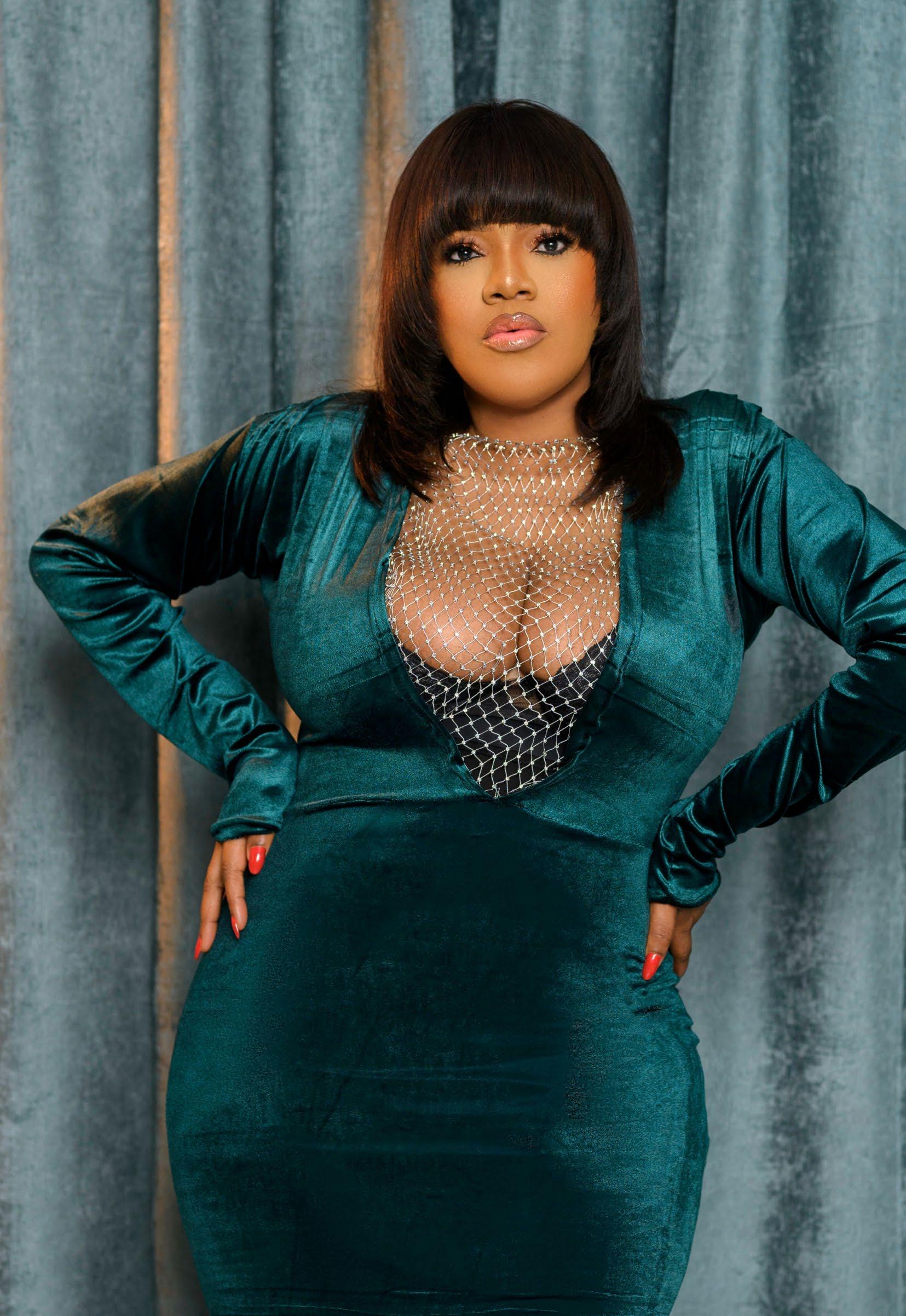
CHRISTMAS EDITION 2022
In a dream, in a vision of the night, when deep sleep falls on people as they slumber in their beds; Then He opens the ears of men, And seals their instruction. (Job 33:15-16).
The Bible tells us how God speaks to us as we sleep. More often than not, those messages turn out to be ingenious and usually quite clear when we apply such instructions that it wasn’t mere men who put the idea in us.


The same is true for Toyin Abraham’s latest movie, Ijakumo. Everyone she told about the film said it was a fantastic movie idea, and when she told them where it came from— a vision from God in her sleep, they agreed it could only have come from God. So she cancelled a movie already scheduled to start shooting the next week, and Ijakumo was born. From comments after its premiere night, it will be a hit when it starts to show in theatres. Not a bad Christmas present, wouldn’t you say?


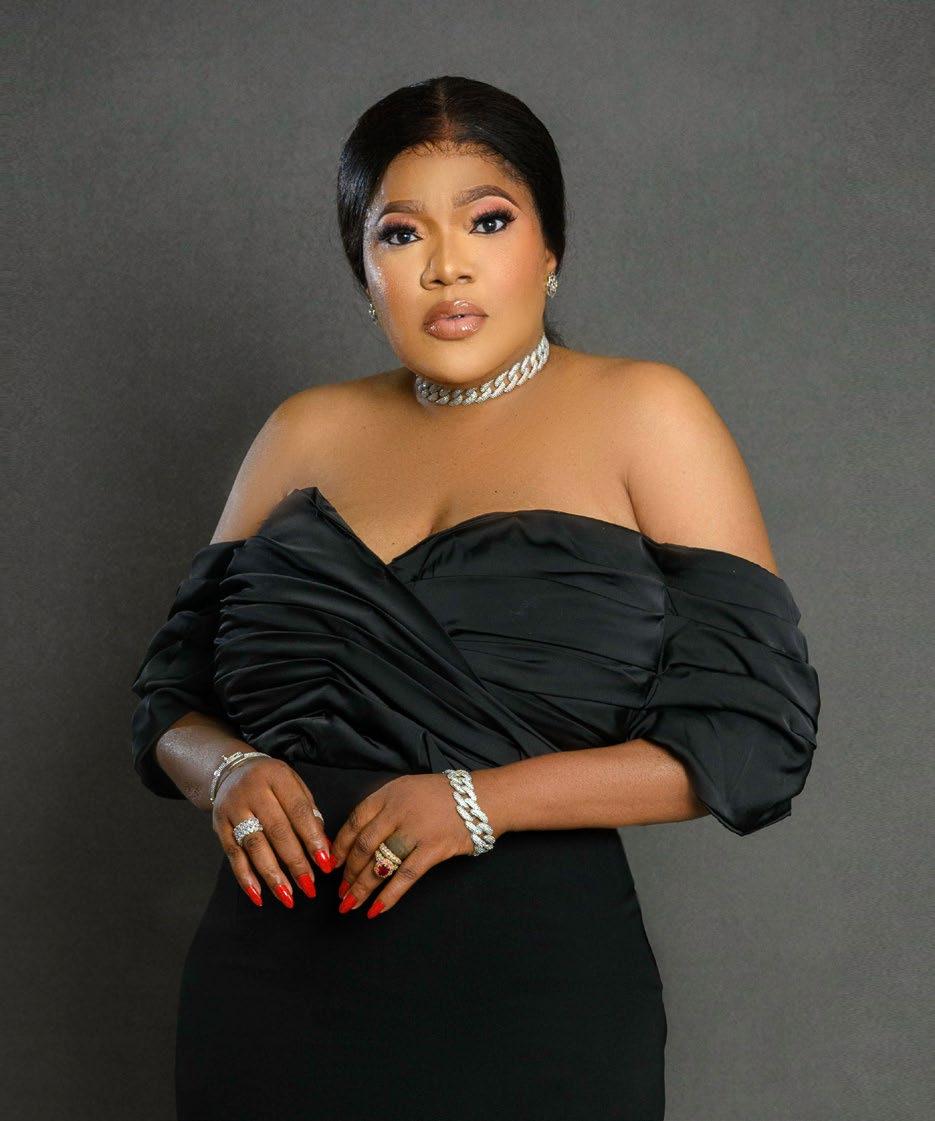
Speaking of Christmas, I saw a picture of my friend and her family. They had taken their daughter to see ‘Father Christmas’, and as is typical with those pictures, the look on her daughter’s face was priceless. It made me wonder, fondly, why, even after we remember being scared, we’ve continued the tradition by making our kids visit the big-bellied guy with a long white beard wearing a red suit.
From there came the idea for a short piece about our visit to the Father Christmas tent and, in the evidence of that visit, a picture; we always had a common look: FEAR.
For some strange reason, it’s hilarious when we look at those pictures, remembering a time of our lives that seemed so scary yet, now counts as a blessing. We can look back on the year 2022 the same way. See the blessing in everything we have been through, good and bad, as we have become stronger in them. We can reflect fondly on how hard it was at the time, but the evidence, a picture, or scar—physical, spiritual or emotional, puts a smile on our faces as we count them all as blessings.

Merry Christmas, and Happy New Year in advance! Until next week, enjoy your read.
OGANNAH


Dorcas Akintoye is a dedicated writer with more than 2 years prolific experience in writing articles ranging from food, entertainment, fashion and beauty. She has a National Diploma in Mass Communication from Kwara State Polytechnic, Ilorin. She loves writing, listening to music and playing scrabble. She is a highly-skilled, enthusiastic, selfmotivated professional writer.

Twitch's death hits differently... his positive vibes he carries are contagious even if you don't know him personally. The happiest people hold the deepest pain Breathtaking








David Nwachukwu has always been immersed in fashion from the age of 10, watching a Dior by Galliano show on television. His work in fashion stretches across media, marketing, brand communications as well as design. As a fashion & lifestyle journalist, David has tracked key industry data for various publications including Industrie Africa, Culture Custodian, Haute Fashion Africa, and HELLO! Nigeria. A Geography graduate from The University of Lagos, David consciously aligns this background in environmental advocacy and sustainable development with the need to promote a more ethical fashion ecosystem. He currently oversees strategic communications at Clean Technology Hub.

CHRISTMAS EDITION 2022 PAGE 2 THEWILL DOWNTOWN • www.thewilldowntown.com www.thewilldowntown.com thewilldowntown thewilldowntown Onah Nwachukwu @onahluciaa + 2349088352246 Odun Ogunbiyi @oddbodandthecity - Contributing Editor Odunayo Ogunbiyi is an ex pharmacist with a passion for food and pampering. Writing about her exploits wherever in the world she may find herself is just her way of staying sane in this zany world. Boluwatife Adesina @bolugramm - Contributing Writer Boluwatife Adesina is a media writer and the helmer of the Downtown Review page. He’s probably in a cinema near you. Photo: Kola Oshalusi @insignamedia Makeup: Zaron CONTENTS AVATAR: THE WAY OF WATER 07 06 16 14 15 12-13 DOWNTOWN CONFIDENTIAL MOVIE REVIEW FEATURE BEAUTY DOWNTOWN MINI THE SCENE DOWNTOWN THE GHOST OF A BOYFRIEND PAST CHRISTMAS CLOTH, GOOD TIDINGS 7 MAKEUP HACKS TO TRY THIS FESTIVE SEASON THE PERFECT CHRISTMAS PHOTO THE UNOFFICIAL CHRISTMAS PARTY EDITOR’S NOTE 8 04-05 FASHION 10 FASHION BRANDS ON OUR RADAR COVER NOLLYWOOD’S LATEST AFOBAJE (KINGMAKER) TOYIN ABRAHAM
AUSTYN
PUBLISHER/EDITOR-IN-CHIEF Editor: Onah Nwachukwu @onahluciaa Editor-at-Large: Chalya Shagaya Writer: Kehindé Fagbule Graphic Design: Olaniyan John ‘Blake’ Digital Media: Oladimeji Balogun Guest Art Director: Sunny Hughes ‘ SunZA’
WHAT YOU SAID @ms_olahmide @jni_international @lanredasilvaajayi INSTAGRAM
Dorcas Akintoye
David Nwachukwu @ebube.nw - Contributing Writer

PAGE 3 THEWILL DOWNTOWN • www.thewilldowntown.com CHRISTMAS EDITION 2022
FASHION
10FASHION BRANDS ON OUR RADAR
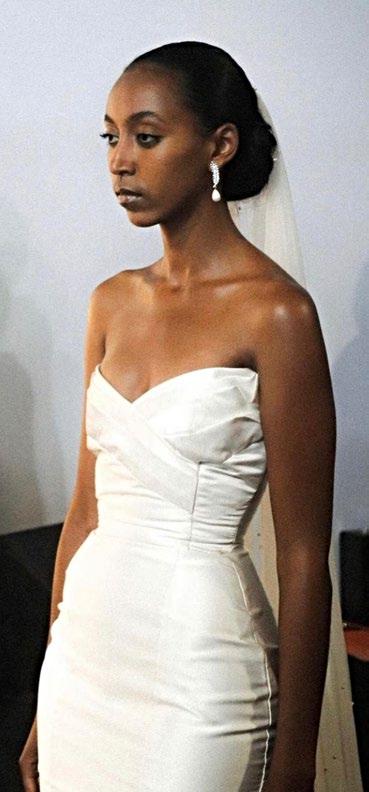 BY DAVID NWACHUKWU
BY DAVID NWACHUKWU
KADIJU
TIFFANY AMBER
With over 24 years of being one of Nigeria’s most enduring luxury fashion titans, Ms Folake Akindele Coker’s Tiffany Amber collections have always been a delight to witness. However, 2022 marked a pivotal year for the womenswear brand known for its fluid, intricate confections. There has been a laser-sharp focus on e-commerce, where the brand’s signature kaftans have seen significant success in global markets. The designer also closed the year out with a bang, staging a glitzy runway show that also doubled as the grand opening of a new retail flagship and the absolutely gorgeous Tiffany Amber Gardens. Rightfully named “The Heritage Collection”, the showcase reminded fashion enthusiasts of all the reasons we fell in love with Ms Coker’s creations in the first place: an ode to whimsical femininity through lush textures, opulent details and high-stakes glamour.



ÉKI KÉRÉ
An adherence to the rich artisanal practices of centuries past has made Eki Kere one of the brightest new talents to watch in the fashion industry. Each piece is meticulously crafted with homegrown textiles, natural dyes and indigenous production methods that preserve local artisan communities. Some of the label’s standout pieces include clothes and accessories with raffia as centrepieces or accents– elevating the material into something lived in, rather than lived with. Elsewhere, a clever method of resist dye informs the direction of the 2022 range, with each motif telling centuries-old stories of the designer’s heritage. The label wrapped up the year with a fantastic offsite showcase at Alara during Lagos Fashion Week, presenting the Good Girl collection.
Across four phenomenal collections in the past two years, KADIJU has consistently honed an aesthetic that defies convention and the rules of style. Led by Oyin Aleshinloye, the label consciously explores design for a new generation of fashion consumers who are mindful of their current climate while being champions of individualism and unabashed nonconformism. The brand caught our eye at the top of the year with a winning collaboration with luxury retail mainstay Temple Muse. The label presented a collection built on texture and an appreciation for the stories that lie in each one. For SS23, they made a case for the amplification of youth voices, paying tribute to bravery of the EndSARS movement on its second anniversary. Kadiju also made a successful foray into menswear, with pieces that not only blurred the lines of gender binaries but also maintained the brand’s codes of experimentation by using Nigeria’s Afrobeats landscape as a canvas.
DESIREE IYAMA
For designers like Desiree Iyama, the business of fashion is much more than a mere venture; it functions as a tool for empowering women through clothes that renew faith and inspire and spark joy in their lives. Coming from a long line of successful fashion designers, Desiree’s approach to design is built around clean lines, opulent textures and reverence for every version of the female form– where every single body is beautiful and worthy of luxury. Spanning women’s ready-to-wear and bridal, the brand’s operational approach incorporates a slow fashion model that emphasizes the need for more ethical production standards across the industry at large. One thing that especially stood out to us is the designer’s love for community and how the eponymous label has highlighted the needs of the women who love the brand with each collection drop, selling out instantly. The past year saw the creative director ramp up its online retail experiences and have acclaimed solo showcases at both Lagos Fashion Week and GTB Fashion Weekend.
CHRISTMAS EDITION 2022 PAGE 4 THEWILL DOWNTOWN • www.thewilldowntown.com
As we wrap up another fabulous year, we look back on ten fashion brands that stayed in our orbit in 2022.
ORIRE
Gaining a cult following over the past year, this womenswear brand is known for its sumptuous cuts and dazzling celebration of femininity. Each collection draws from Orire Alesh’s personal experiences, culture and understanding of the lifestyles of women in her orbit. This consciousness has helped the label steadily build its clientele, spawning bestsellers such as the Honey dress, seen at weddings across the globe all through the year. 2022 saw the designer make a powerful Lagos Fashion Week debut while also emerging as one of Moda Operandi’s brands to watch, with the SS23 made available for pre-order on the site’s coveted trunk show list. By utilizing complex draping and pattern drafting to tell powerful stories of women, the designer has firmly positioned herself as one to watch in the years to come.
FRUCHÉ
Frank Aghuno is the perfect example of what happens when a designer is allowed to fully blossom and create their point of view. Since launching his artisanalleaning contemporary label, Fruché, in 2016, he’s deftly explored women’s and menswear, showing increasing growth in technique with each passing season. Aghuno primarily draws inspiration from his Southern Nigerian heritage, where he mixes afro-modernist silhouettes and contemporary cuts with details that revel in the beauty of Bini, Igbo and Niger Delta cultures. He uses these inspirations to tell vivid stories of Nigerian life while offering accessible pieces that have earned him a rabid celebrity following that counts Seyi Shay and Eku Edewor as fans. The past year has seen Fruché gain an even bigger global following, with increased retail presence via The Folklore and Industrie as well as a feature in the landmark “African Fashion” exhibition at the V&A Museum. Notably, the brand has doubled its efforts to create sustainable collections through fabric upcycling and ethical textile production methods.

GETO WORLD
Samantha Adebayo has her finger on the pulse of global youth culture and consciously blends that with homegrown narratives. She makes clothes for a young generation entirely born in the internet era, connected by digital regardless of culture. Her pieces have a modern streetwear appeal that incorporates storytelling inspired by her native Nigerian culture. It’s an aesthetic that’s garnered fans in young consumers and big music names alike. It’s also one that’s right in line with a post-pandemic attitude towards getting dressed for daily life.

According to a report analyzing global fashion in the wake of work-from-home, a host of brands churned out capsule collections filled with kimonos, kaftans and other easy-to-wear items, replacing elaborate gowns and evening wear. Géto’s no-fuss approach to design embodies this perfectly while going a step further to edge the market with pieces utilizing indigenous textiles and finishing techniques. In 2022 the brand made a splash by showing its Iberu collection at Paris Fashion Week in October and launching a bespoke label, “House of Geto”, via collaboration with Austrian Lace at Lagos Fashion Week.
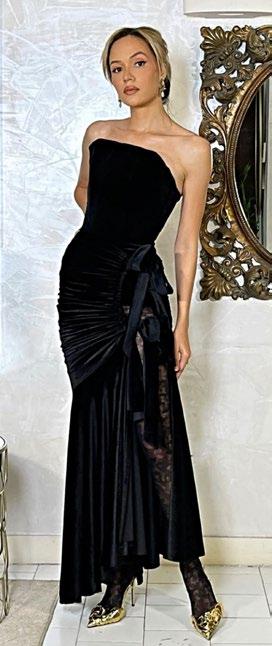
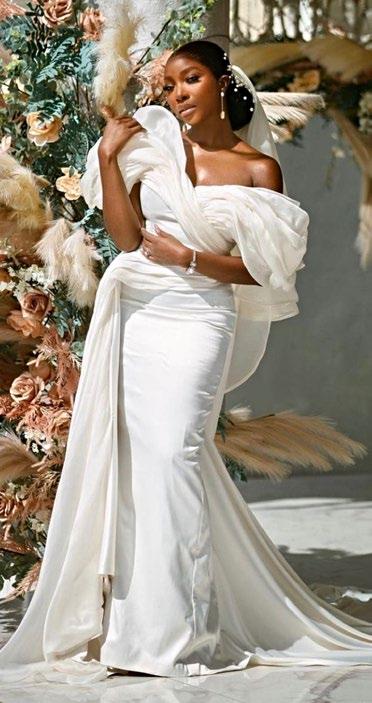

TORLOWEI
The mother-daughter duo at Torlowei are filling a long-overdue market in Nigeria’s burgeoning fashion industry. Positioned as a luxury lingerie fashion brand, their vibrant hues and lush textiles have become the go-to for every chic fashionista, going beyond the bedroom to festivals and red carpets across the world. In 2022, the label was shortlisted as an Emerging Design finalist at the CNMI Sustainable Fashion Awards in the Bicester Collection Award category. Fresh off the heels of that acclaim, Torlowei went on to make a stunning presentation at Milan Fashion Week, where its sizzling take on modern lingerie garnered new fans and the attention of buyers alike. Notable fans include Tems, Asa and Erica Nlewedim. The brand is also known for crafting its pieces in Nigeria’s first registered lingerie factory, opening up avenues for much-needed sectoral growth.
MAZELLE
Mazelle wears its African artisanal inspirations on its sleeve, boasting a design aesthetic that doesn’t shy away from bold patterns, embellishments and bright, punchy colours. Since changing the brand name from Mademoiselle Aglaia to Mazelle Studio a few years ago, Mariam Afolabi’s multi-brand concept has extended business operations to include bespoke and bridal services, which have gained a major foothold on the Nigerian luxury bridal market in the past year. In addition to creating fun, high-concept, eclectic clothing in its ready-to-wear range, the brand has also defined its own industry niche through a winning approach to fashion marketing. Their digital strategy blends a strong understanding of afri-pop culture with visual messaging that champions local creatives, models and artists.
VICNATE
In the years since his much-talkedabout 2018 debut, Victor Anate has steadily gained an army of fans with his revival of old-school Parisian luxury and glamour in Nigerian fashion. The growth with each season has seen his aesthetic come to potential to match the work of creatives such as Anthony Vaccarello, Hedi Slimane and Olivier Rousteing. The designer cleverly incorporates design inspirations from arthouse films and vintage photo essays into his signature draping style. Vicnate’s formula works now more than ever because he’s emerging at a time when fashion consumers are itching to get dressed to the nines again after a year of being locked in during the global pandemic. This year saw the label reach new heights commercially and culturally. Vicnate maintained its status as the go-to label for glamour, making custom pieces for global fashion icons like Iman and entertainment superstars such as Eku Edewor.

PAGE 5 THEWILL DOWNTOWN • www.thewilldowntown.com CHRISTMAS EDITION 2022
FASHION
DOWNTOWN MINI
THE PERFECT CHRISTMAS PHOTO
BY KEHINDÉ FAGBULE
Father Christmas. I’m sorry, Santa Claus. Our relationship with that guy as children is really hilarious.



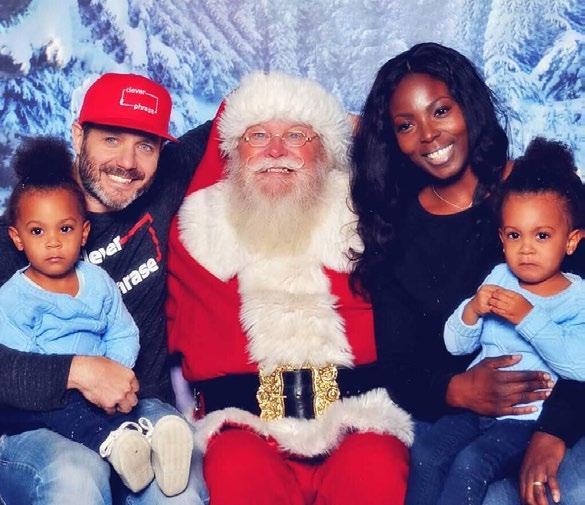
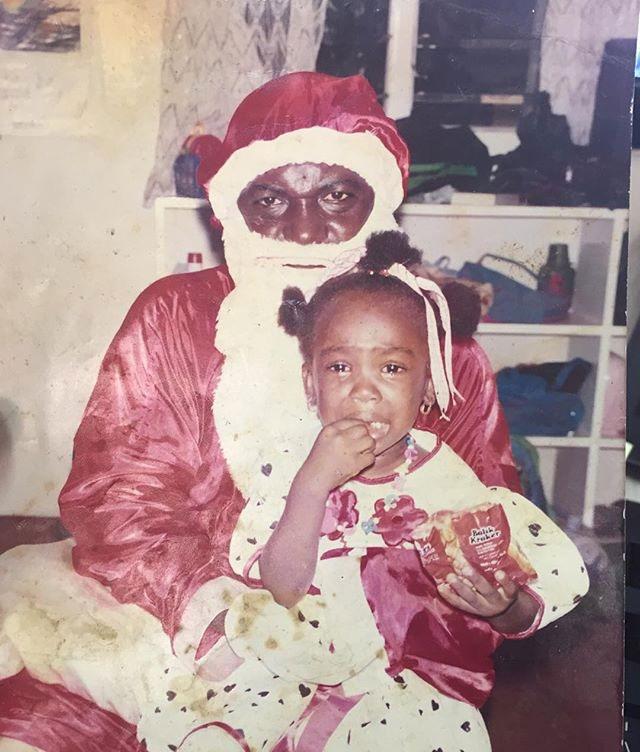
For over a thousand years, if you can take your mind back to when the first Santa Claus costume was made, this tradition has been allowed to fester. According to Wikipedia, Santa is a legendary character originating in Western Christian culture who is said to bring children gifts during the late evening and overnight hours on Christmas Eve— toys and candy or coal or nothing, depending on whether they are ‘naughty or nice.’
In the legend, he accomplishes this with the aid of Christmas elves, who make the toys in his workshop, often said to be at the North Pole and flying reindeer who pull his sleigh through the air. Now, as interesting as that may sound, that Disney-esque fairytale doesn’t exactly transition smoothly into real life. Kids are clearly not that into this man.
Across cultures and traditions, children react to the man in the red suit almost identically— frightened. Can we blame them? We did the same at some point. Remember your first-ever encounter with him? Perhaps he came to your school’s end-of-the-year party, or your parents took you to a recreational park to see him alongside other kids. Scared to death, but at the same time, confused with why the people who are supposed to be your guardians have just committed you forcefully into the hands of this man, this strange-looking man. I mean, nobody gave you ‘the Father Christmas talk’ prior, right?
Maybe there should be an age limit for Santa Claus visits. Not like that doesn’t come with its own worries as well. When you tell your children about the man from the North Pole in a bid to make Christmas as significant as possible, in what light do you portray him? How do you prepare your kid(s) to meet him? It is already a selfless thing to do, giving the man props for the gifts you bought yourself.
Since the inception of the legendary character, kids have been photographed weeping profusely beside him. One would wonder if the day was meant to be a day of joy. And not a single parent in the universe dares to do it differently, even though they have once been subjected to the same torture— because let us call a spade a spade, it is torture. Or how else will we all know it is Christmas if Father Christmas is not in the picture? Maybe it is time to start investing in Photoshop to stand the chance of creating the perfect Christmas photos. Let’s spare Junior the
THE MCCLURES
CHRISTMAS EDITION 2022 PAGE 6 THEWILL DOWNTOWN • www.thewilldowntown.com
DOWNTOWN CONFIDENTIAL
The Ghost of a BOYFRIEND PAST
BY DORCAS AKINTOYE
As I walked into the bank, I sighted him in the customer service section. He was standing with his back to me, and from the height and shape of his head, I knew it was him. I stopped, sick with apprehension. I thought of leaving the bank before he saw me; deep down, I hoped he would not turn around until I had gathered my nerves.
My throat felt tight when he turned, and he was not Obinze. I could tell my head was filled with his ghost; this was not the first time I would be experiencing what had just happened. For a very long time, I have had several imagined glimpses of Obinze. I had imagined seeing him several times, and it was beginning to get out of hand. After so many months, I decided to call him to free myself from his ghost— it was Christmas, after all, so a good time to get closure. As soon as I heard his voice, I began to remember everything that had happened between us. He spoke with that voice I had not heard for so long, and it sounded both changed and unchanged. I couldn't believe I had agreed to go to his house after everything.
Obinze and I had a loving relationship, and we decided to take the bold step of getting married after two years of dating. We had plans and high expectations for our wedding, but suddenly our plans capsized when his family told me that I had to get pregnant before they accepted me into their family.

Months passed by still nothing happened. I went to several hospitals to get checked and was told nothing was wrong with me. Obinze’s family insisted on not accepting me into their family until I got pregnant. A year later, I still couldn’t get pregnant, and Obinze's family was beginning to get impatient. Although he tried his best to support me through the maltreatment I received from his family, deep down, I knew my relationship with him might not last. I was not surprised when he told me he was getting married to another lady who was already pregnant with his child. He blamed the pressure on his family, but I knew he had the power to make our relationship work if he really wanted to. At the same time, I couldn’t blame him; anyone in his shoes would have done the same. No one wants to get married to a barren woman. I decided to move on with my life and forget about him.
But here I was; at his house. I stood in front of his door, waiting for him to open it, and the moment our eyes met, there was a carving of the blue sky, an inertia of stillness. When neither of us knew what to do, he moved towards me, and we hugged. Sitting in his living room, I was flustered as the words ‘Merry Christmas’ came out of my mouth in a shrillness that annoyed me. He was looking at me; unabashedly, and I could not hold his gaze. My fingers were shaking uncontrollably, which was bad enough, but I could not even stare into his eyes. He was looking so calm; we both could read what was going through each other’s minds. I had not forgotten but merely remembered anew how understated his manner was, his charisma, every little thing about him. He told me about how he was deceived with pregnancy by his supposed wife, who was after his money and that the baby wasn’t his because he was diagnosed with a blocked sperm duct and was releasing only semen, which was why I couldn’t conceive. He mentioned he tried contacting me before going for his surgery abroad, I heard his words like a melody, and I felt myself breathing unevenly. I could not cry; it was silly to after so long, but my eyes were filled with tears; there was a boulder in my chest and a stinging in my throat, but I made no sound.
Obinze took my hands and clasped them in both of his as we sat in
silence. An ancient silence that we both knew. I was in this silence and safe. We couldn’t deny the attraction. Between us, there was a weightless, seamless desire. I leaned in and kissed him. At first, he was slow in response, but he pulled up my blouse, pushing down the bra cup to free my breast. I remembered clearly the firmness of his embrace, and yet there was also a newness to our union. Our bodies remembered and did not remember. Freeing my breast, he lavished them with kisses, nips, and teasing licks. As my back arched for more, he kissed his way down my body, lingering in the narrow depression of my navel. He listened to my breathing grow deeper, then faster, turning to frustrated gasps as he hooked a thumb in my panties and inched them lower.
Gripping my thighs, he made more room for himself. I trembled against his soft hands, my whole body quivering. He traced the hot core of me, circling round and round while my legs wrapped around him. Pressing a kiss on my lady bits, he left me. I knew he wanted to bury himself deep between my legs, and I couldn't wait. Then he pulled me back, and with a thrust of his hips, he sought the place he’d wanted to be ever since he laid eyes on me. My body hovered near fulfilment, humming with frantic nerve endings just waiting for their moment to sing. But I didn't want it to end. I wanted to lay there with Obinze wrapped up in my arms for hours...Days. His thrusts grew harder. Deeper. Faster. I held on tighter as I matched his movements, thrust for thrust as I tightened my vaginal muscle while circle-thrusting to his rhythm. He always loved that, and I heard him let out a deep moan. I had missed hearing that; I loved hearing him moan; it pleased me that I was giving him pleasure. He was thrusting harder and faster now, and as if he wanted to enjoy every bit of me, he slowed down his pace to prevent himself from c••ming. At that moment, he pinned my hips with his and started moving them in a slow circle; I flew apart with a cry, my legs shaking and my body rocking with hard spasms. The power rushed me in waves, and I had no choice but to let it take me. He followed suit before my release stopped, so our orgasmic cries mingled at one point, each at the mercy of something lush and wild.
I clung to Obinze to steady myself in the long, silent moments afterwards. My mind cleared slowly as rational thought returned. In a way, I'm thankful he married that girl because she helped him find out he had a blocked sperm duct. I now believe that everything happens for a reason.

PAGE 7 THEWILL DOWNTOWN • www.thewilldowntown.com CHRISTMAS EDITION 2022
Nollywood’s Latest Afobaje (Kingmaker)
Toyin Abraham
“Iremember those times” she said, “days of home video…” as she started to take us down memory lane. Before that, legendary Nollywood actor and filmmaker Toyin Abraham had shared with us the good news of a new endorsement, the second one in December, two of the many others she had signed with in the past or holding concurrently. A week before the release of her thriller blockbuster, Ijakumo, DOWNTOWN’s Editor, Onah Nwachukwu, and Writer, Kehindé Fagbule, sat with the 10-years Nollywood’s top-grossing actress. In a long heart-to-heart with the 42-year-old actress, often interrupted either physically by family members who set an emotional basis for her to be vulnerable through the course of the interview or virtually on the phone with friends, partners and colleagues whose conversations revolved around the success of the upcoming movie premiere, we, in every sense of the word, ‘met’ Toyin Abraham.
Toyin, who started acting at 20 years old, shared her surreal experience meeting veteran Nollywood actress, Bukky Wright, on a movie set at the beginning of her 22-year-old career. “Back then, seeing Bukky Wright talk live was unreal, and you thought, ‘so she talks.’ It is not now that social media has made everyone close. Back then, how do you see them (stars)? I announced our meeting to everyone, hoping that by the time the movie came out, the whole world would know me through my three-scenes performance. But God has a way of doing His things. The movie that I did with her didn’t get released until 10 or 11 years later. And when it eventually did, I was one of the faces they used to sell the movie—it was just Aunty Bukky and me on the poster,” she concluded.
Toyin continues to reflect on her illustrious career, “that is why most times, I respect people, but I respect newbies more because now we have gotten to the level in our career that if we are aiming for anything now, it should be the Oscars. Anything that wants to happen can’t be more than that. I have been exposed to many endorsements and have come a long way. There is no brand I’ve not worked with in Nigeria, Coca-Cola, Indomie, Quickteller, and banks; you name it. But still, I respect the newbies because no one knows where they might end up. In the industry, some people call me, and I will answer 200 times, while others, I won’t because they are agbaya (a Yoruba word for old and mischievous). They’ve done a lot of terrible things to me. Someone once chased me off location because I didn’t do as I was told. I’m now in that position of producing, and I let actors be. For instance, a girl in my

movie is an up-and-coming actress, and the first time she acted was in my YouTube film, so this is her first cinema movie. Sometimes I would tell her to stay somewhere, and when I came back asking for her, they would say she had gone out. The next day she’d come on set feeling unwell from the long party. In one instance, we couldn’t even shoot because of how bad it was, but will I tell her to leave the location? Won’t she live her life because she wants to be an actress?”
With every industry, there is a power structure; one that shapes the relationships between actors, old and young alike. Outside of those interpersonal relationships, up until less than a decade ago, Nollywood witnessed subtle segregation. The Southeastern subsection of the industry—which mainly produced Englishspeaking films—was more marketable than the Southwestern productions—the Yoruba films. This apparent divide meant that, for so long, the former was primarily regarded as mainstream Nollywood and, as a result, became a platform that Yoruba film actors aspired to be part of. Toyin Abraham was one of the Yoruba actors that led that charge. She narrated the pivotal role she played in blending both industry strata. “Yes, yes, You are right. I don’t even remember anymore,” she affirmed the Nollywood segregation. She elaborates, “back then, Yoruba movies were
PAGE 8 COVER THEWILL DOWNTOWN • www.thewilldowntown.com
not considered part of Nollywood. And then, even while doing Yoruba films, I was very popular, even more popular than many of them, but was still struggling to enter Nollywood Asaba. That’s why I said God has a way of doing things. I was always hustling for a call from them (Nollywood Asaba), not knowing that the first cinema movie I would be part of was Aunty Omoni’s (Oboli) movie, Okafor’s Law It was big.”
Even after announcing herself on the big screen through Omoni Oboli’s Okafor’s Law, the industry still wasn’t opening up for Yoruba actors. “No, no, still they didn’t accept us. I remember they usually called me for meet and greet sessions because I could pull a crowd, so I’d do the meet and greet. When I realised what they were doing, I stopped attending those meet and greet sessions.”
The talented actress continued, “I can say I am one of the people that fought that battle to bring Yoruba films to the cinemas. Because for my first produced movie, which showed at FilmOne, it wasn’t as if they (FilmOne) believed in me at first. But when I had a meeting with them, and they asked how much I thought the movie would make, I said I would do 80 million naira— this was when the highest, Aunty Omoni’s, was doing 40 to 50 million. They looked at me funny. And you know then, I didn’t have money, so I couldn’t even kack up (to dress up in style). The person working with me told me he didn’t think they would like me because something had happened, and I couldn’t change clothes before attending the meeting. But I don’t live to impress people. That was my first cinema movie, Alakada Reloaded, and we made sales of 79 million naira. Since then, I have never made less than the previous project, and they realised that Yoruba films have a market too. If I had failed, it would have affected many people.”
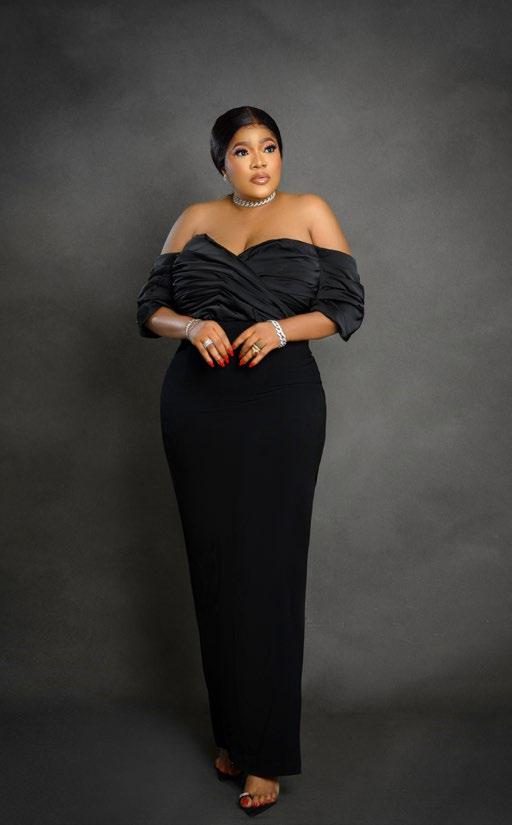
Is there still segregation on the big screen? Toyin responded in negation, “Not anymore. Now it is over. King of Thieves (Agesinkole),
on King of Boys.”
a traditional movie, made 320 (three hundred and twenty) million naira, and it was not during the festive period. And it wasn’t your regular Yoruba, we conc (concentrated, deep) Yoruba, and I read incantations too.”
No doubt that the leap from production for home video to production for cinemas is a big one. Toyin Abraham, who transitioned from the former to the latter, spoke on the major challenges filmmakers like herself face in the industry and how she keeps improving with each new release. “I started producing when I was even in the Yoruba industry, but I realised that producing for the cinema is a different ball game. Although we have people that go the extra mile, in Yoruba films, there was also a margin for error to say, ‘let’s shoot it like that, even though it is not standard quality.’ You can’t do that with a cinema film. But I keep going. It’s not easy; it all comes down to funding. Ijakumo is going to be the biggest movie in my entire career. This time we had money to shoot, so we went all out. I got a lot of brands to support the film. When I was shooting back then, we would have to make do with a seven hundred thousand naira budget. Won’t we eat? For this film, my budget was almost two hundred million, so I did it well. My Editor, Steve Shodiya, is the biggest in Nigeria; he worked
Regarding budgeting and corresponding quality control with productions in the industry, the conversation can be tedious, and it is not just in Nollywood. Toyin’s response to this common trend was as real as it was insightful. “I’m going to be sincere and open. What you said now (on filmmakers not spending the entire budget on the project), maybe seven or eight years ago, I would have done the same if I had the opportunity. It’s poverty; it is not easy. Now, my husband is going to London to shoot, my son is upstairs sleeping, and my daughter is upstairs, and we travel first class or business class now. At the end of the day, it is hard work and God. If I take account of all the blessings— houses we have and other things, I start crying. And all these things happened in five years. That’s why people think I’m obsessed with FilmOne; even in FilmOne, they call me the First Lady. Yes, I am obsessed with Moses, Ladun, Mimi, Kene, and Tolu. The first time they paid me, it was forty-two million. I wanted to die. After I received the money, as far as I was concerned, everybody wanted to kill me. Even when someone innocently talked to me, I thought they wanted to
kill me; everything looked like a gun. Would you believe I’m still making money(royalties) from that movie done five years ago? After cinemas, I still have money in foreign currency waiting for me from Netflix. And then the airlines will buy them as well. Amazon, DStv and so on will also buy them. So if I were to answer your question truthfully, I’m sure that if it had happened to me years back, I’d have done the same thing. Then, if you had given me ten million to shoot a movie, I might keep five for myself. But now, if you give me five hundred million to shoot a movie, I might have to add to it to be able to shoot an excellent movie.”
Things are clearly different now, and it is apparent in how the legendary actress narrated her experiences as a struggling actress back in the day, with tears forming around her eyes and the phone calls she attended to throughout the interview corroborating her financial upliftment. Checkers Custard, Purit, Indomie, Fairmoney, Wakanow, Goldberg, Spar and recently, Quickteller and Balvenie Whisky—European premium single malt scotch brand, whose biggest criteria in their ambassador selection process was humility amidst fan love—are some of the endorsement deals she’s signed in recent times. She basked in the grace that has made her a fan’s favourite and one of the most viable public figures whose brand is synonymous with trust and immense influence. As we talked finances, a call came in from acclaimed Director, Tola Odunsi, who called to inform her that he was shopping at SPAR because of her. “Because I had the Fairmoney deal, Quickteller had to wait. I was shocked when Uncle Paulo called me and asked if I was still with them (Fairmoney). Why didn’t they use someone else when they knew I was with Fairmoney?” Toyin said.
The industry’s highestgrossing actress— for four consecutive years—speaks on another of her income streams, royalties. “When I started working with FilmOne, was when I understood what royalties meant. Back then, there was nothing you could do about it with our marketers in the Yoruba industry. You act in a movie, give it to them, and they sell it in Idumota. I didn’t even know they were making money from YouTube. And when the movie comes out, they can give you

PAGE 9 THEWILL DOWNTOWN • www.thewilldowntown.com CHRISTMAS EDITION 2022 COVER
“I realised that producing for the cinema is a different ball game. Although we have people that go the extra mile, in Yoruba films, there was also a margin for error to say, ‘let’s shoot it like that, even though it is not standard quality.’ You can’t do that with a cinema film.”
COVER
between fifty to two hundred and fifty thousand naira, that was it. It was FilmOne that explained it to me. So even when I hear people saying FilmOne this and that, I’m like, when I was naive, these people opened my eyes to many things. Fine, we fight sometimes. That’s normal. I can leave the group chat five times in one month, but they laugh it off and are still there for me. When they asked me how I get paid for my movies, and I told them that I often hand it over to the marketer for a one-time fee, they introduced me to royalties and assured me that I would ‘eat it’ till I die. And it’s true. I’m still eating.”
When asked what she earns per feature, she responded, “I normally do five to seven million naira per feature, but there is no way you don’t consider relationships even in business. But I will put the average at five million naira.”

Abraham attributes the change in fortune to her name change six years ago. The actress who started her acting career as Toyin Aimakhu explained the reason for the rechristening. “My dad’s family name is Aimakhu, short for Aimakhume, which means ‘you are just chasing me for nothing.’ People told us to change it a very long time ago, but I didn’t listen because I had started acting with it. All my sisters were married then, so they had already changed it to their husbands’ last names. The only son we have in our family changed his name to David Abraham. One day, a vision came; a pastor from CAC (Christ Apostolic Church) told my mum to tell me to change the name. The pastor said the name is not good as it will make people beef with me for no reason. And that was something that used to happen a lot. My life changed.”


A lot has changed, not only in the actress’s life but also in the industry and how we consume its productions. Before the cinema became home to new releases, film rentals—CDs and video cassettes—were our go-to. With the advent of technology, streaming is gaining more popularity by the day, ensuring that we enjoy our favourite titles from even our mobile phones. Is this a potential threat to the traditional movie-going experience? “I don’t want the cinema culture to die because that is our culture. Netflix and Amazon are not Nigerian stuff. And the way we say it, many people at the grassroots don’t even have Netflix. If you go to the cinema, there is a whole festive mood. Some people are not on Instagram and only see adverts on Facebook and decide to watch. For some people, the cinema is the only recreational centre they go to throughout the year. Some people don’t even go to watch movies; they go just to experience the lift and escalators. So I don’t want the culture to die. Do you think they’ve not called me to shoot for Netflix? They have. Moreover, I don’t do YouTube films anymore. I now use my YouTube movies to groom my actors and select from the lot the ones ready for the big screen. The only thing I do in any of my YouTube films is one or two scenes just for sales, to attract viewers. So the only place I’m relevant in my country is the cinema because most Nigerians don’t have streaming access.”
Toyin’s consistency on the big screen is admirable. In addition to her earning her deserved reverence in the cinema, nobody gets the crowd going how she does it. She does it with impeccable storytelling laced with cutting-edge production that constantly pushes the limits and sets industry standards. At the premiere of her new movie, Ijakumo, friends, family and colleagues were once again reminded of it. She talks about how she birthed this new brainchild of hers. “When I saw the first cut of Ijakumo, I was actually crying. Kehindé, Omokehindé that is going to be one of the biggest movies that have ever come out from Africa,” she said with utter confidence. She goes on to narrate the conception of the idea for the blockbuster. “I’m saying it with my full chest. I don’t know what happened. I had another story; it was about Osun, Osogbo. We had gone for wrecking in Osogbo; we were supposed to start shooting the following week, and then I slept. In my dream, I saw the film, and we watched the film together. You know, dreams are funny. I saw many people coming out, and someone said, ‘why
did you put that kind of film on YouTube? We are all coming from there. In less than an hour, 94,000 people watched it. Go and remove it and put it in the cinema.’ I carried it and went to the cinema. As I got there, someone sat down, I went outside, and there were many people. So I shouted, ‘Vicky, oya bring the standie (roll up banner).’ I then went back inside, and the person there said we needed more adverts, so I asked how well the movie was doing on the first week of release (Thursday to Sunday), to which the person replied, ‘three million Naira’ and I felt a bit down because we were going to eight hundred million. But then the person encouraged me, saying that if we could make three hundred without adverts, we would definitely do more with them… That was when I woke up. As soon as I woke up, I recorded a voice note telling the story to Kehinde Joseph. He asked me where I got the story from, and I said in the dream, and he replied, ‘this is one of the best stories I have ever written in my career.’ Kehinde Joseph writes 90 percent of the big screen. In the FilmOne group chat, I told them I was no longer shooting the following week and wanted to change the story.”
She called production designer, Tunji Afolayan, who corroborated the story as she continued narrating what sounded like a revelation straight from God. “Uncle Steve, on the other hand, whose shakara is plenty (rightfully so) because he mostly does international jobs, called me at 6 in the morning to ask me where I got the story. I told him, ‘in the dream,’ and he replied, “it has to be.” The next thing I knew, he formed a group chat, and when I asked why, he said the story was too deep. Everything is in the story, and it is not like it was unnecessary. Most of our pastors you see, aren’t even pastors. They are doing business. The wife, too, just wants to be called Mummy G.O. It is too deep. We overshot the script; I was not in a hurry. I shot two to three scenes a day, sometimes one scene. And we just shoot for five days, and everybody rests for two days. I paid everybody well; I was not in a hurry. When I called Aunty Bimbo (Akintola) to take a role in it, she was hesitant, but as soon as she read the script, she said yes. There’s no how you would read that script and not want to do it. I remember Kunle (Remi) was supposed to go to Canada for Anikulapo, but he came with his manager to say he won’t go, and God was so on the project. The guy (Kunle’s character, a pastor) did aworo when he was young. Aworo in Yoruba is a jazz that people do to attract customers to their business. Anything you do, the crowd will just come. So when we wanted to shoot that church scene, I needed that crowd, and I just did one video. It was when I saw the crowd I just sent a message to Indomie— because I have worked with them—that I needed Indomie, and they came with a truck to feed people for me.”
The filmmaker showed us the video she posted on her social media platforms calling for extras to fill up the church to shoot a typical Sunday
CHRISTMAS EDITION 2022 PAGE 10 THEWILL DOWNTOWN • www.thewilldowntown.com
“
I respect people, but I respect newbies more because now we have gotten to the level in our career that if we are aiming for anything now, it should be the Oscars.”
service. She had requested 1000 people, but 1500 people showed up within less than two days of the video announcement, enunciating her influence in the industry.
Toyin, who has seemingly slowed down in volume this year, talks about her transitioning through her 22-yearold career. “This year, I only did one film, Femi Adebayo’s King of Thieves (Agesinkole), before my movie. I’m 42. I’ve reached a point in my career where it’s like, what else? I play someone’s mother now. I might look young—you know we deceive ourselves as women when we claim to be still young; it’s a lie. For them to use me as Akin Lewis’s wife means I’m old. Now, I am afobaje (kingmaker).”
On the personal life front, the legendary actress is surrounded by love. “What happened to my marriage? My marriage has never been rocky. Rocky ko,” was how she responded to the rumours of her having a rocky marriage at some point. What does she think kick-started that rumour, one might ask? “Sometimes, when people don’t have a job and know that there are some marriages that people do not want to hear anything about—my marriage, Adesuwa’s (and Banky’s), Adekunle’s (and Simi’s) they make stories. It was my husband I was talking to when I said I was suffering and called him “ode”. That’s how close we are. We are friends. We might be in the house for three days and not see because I’m sleeping. I could be in my room sleeping, and my husband will be with our son and tell him not to disturb me as I sleep. Sometimes I will feel him peck me on the cheek as I sleep. On some days, he will come to my room, and we get intimate; My husband and I don’t have issues. We don’t. I think the only thing that can make me and my husband have issues is when a strange woman walks in and claims to be pregnant because I don’t check my husband’s phone. I used to when I was younger while we were dating. He doesn’t check my phone either. We don’t do business together. He has his YouTube, and I have mine, but we don’t produce together. If he’s shooting his film, he can call me, and I will come as an actress. So many people expect a public display of affection (PDA), but we are not the type of couple heavy on PDA, making it look like the norm. I do it once in a while. I will go and hug him from the back in public. Everybody in my family is happily married, I’m from a Christian home, and my sister in Canada has been married for nearly 20 years. We don’t fight. The only time we fight is when I remember that we’ve not fought in a while, so I try
to stir something up. The way our marriage works, as he’s not currently at home, I take up the bills. If I’m not at home, he takes up the bills. He is renovating our house in Ibadan. When he told me, I was like, “aw pele, no wonder you are broke.”
He is handson with the children. If he’s shooting or I’m shooting, and we run out of money, we borrow each other. Sometimes you see his name as an executive producer for this reason. We don’t have a joint account. My husband does video calls with his female friends; I do video calls with my male friends, and they all know each other. He is my husband; people don’t understand marriage; they think marriage is only loving; that is the only person you will be with till you die. Love is only about one percent. Just be with someone you can condone. If it’s love, you will be tired of it, and the spark will not be there again. If you are dating, you will feel like you love yourselves because you are stealing it (using a food analogy). But you will be filled up when they put the food on your lap for life and say, eat’.”
Toyin could not stop gushing about her husband, fellow actor and filmmaker, Kola Ajeyemi, who played a bit part in her new movie. She talks about how big a father figure he is in their son’s life. “My son, Ire—3 years old—is still sleeping. He is unhappy because his dad travelled to the UK and will be back tomorrow (the day after the interview). I pray especially that God should not allow anything to happen to my husband.”
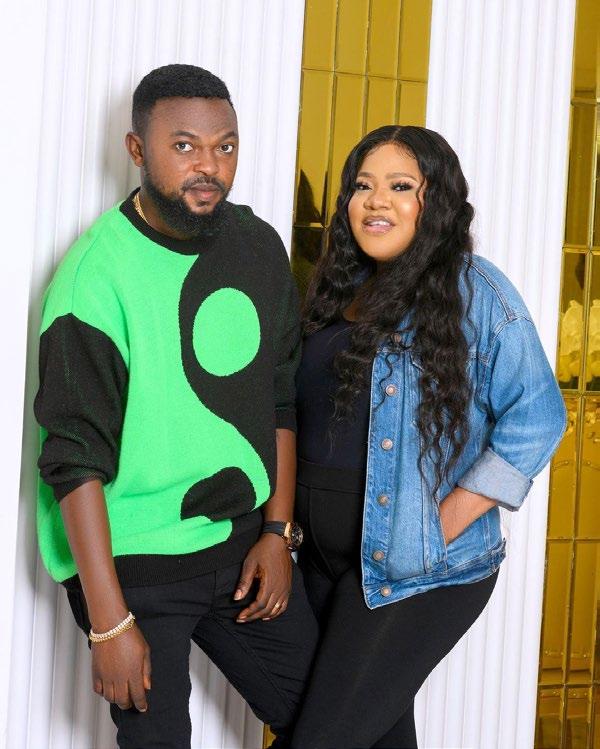

Toyin herself went through a bit of a rough patch as she confirmed the terrible news of
her miscarriage. “It’s not a thing of joy, so it’s not something I like to… It’s not a date I want to remember. I’m alive, so I’m fine. It was painful, though, because I just wanted to have one more and call it a day.”
When asked if she would try again, she replied, “I will try o!” Emphatically.
Are there any imminent projects we should be looking for next year? The founder, Toyin Abraham Productions, would instead focus on the one in the cinemas.
“I produce once a year, so of course, I will come back. But I know this movie is going to bring a lot of goodies. Trust me; I have never been relaxed about a movie (like this one). In the past, you would see me do TikTok videos now and then. I’m not doing that with this one.”
The chat, which has stirred up a rollercoaster of emotions, ended with the actress, a mentor to many, leaving a piece of advice for up-andcoming actors, and it is heavy on respect. To sustain a career at the very top level in films requires a lot of things, and Toyin reckons that at the heart of it all is respect. “They should keep pushing, put a lot of work into their social media and be respectful. Most of our up-and-coming actors are spoiled. You can’t see me even on national television(TV) saying, “Omoni Oboli called me for film,” I won’t say that. It’s our culture. I will say, “Aunty Omoni.” I once saw Mummy Joke (Silva) on the red carpet and knelt to greet her. I am used to it. I won’t say because I’m on TV now, then I forget where I am from. If they ask me who my role model is, I say, “Aunty Omotola Jolade.” I won’t say “Omotola Jolade” that’s not being woke. How you show your wokeness is through money and talent. Most of them are spoiled. They will never stand up. There’s nowhere I am; if I see Aunty Fathia (Balogun), or Aunty Iyabo (Ojo), I will stand up to go and greet them. Aunty Iyabo is older than me by three years, but can I buy it in the market? Even when you call them for a film, they will not post. They have turned their Instagram page into an album; they would rather post on their story.”
The premiere hosted some of the biggest names in Nollywood with a significant bonus in the presence of the Lagos State Governor, Babajide SanwoOlu. In a flurry of emotions, the film’s lead actress, Lolade Okusanya, could be seen showing her utter gratitude as she hugged the film producer, Toyin Abraham, who had given her her big screen debut, affirming her status as the latest afobaje in Nollywood. If there is anything that must be clear in the Nigerian film industry right now, it is just how much Toyin Abraham-Ajewole is loved and revered.
PAGE 11 THEWILL DOWNTOWN • www.thewilldowntown.com CHRISTMAS EDITION 2022 COVER
“Everybody in my family is happily married, I’m from a Christian home, and my sister in Canada has been married for nearly 20 years. We don’t fight. The only time we fight is when I remember that we’ve not fought in a while, so I try to stir something up.”
BY DORCAS AKINTOYE

There are many things to consider when it comes to festive makeup, especially for the Christmas and New Year celebrations. Since you will be partying for long hours or even be involved in several activities, you should consider wearing longlasting and waterproof makeup. To spice things up, you can experiment with a new statement look for whatever event you plan to attend.
Below are some makeup hacks to help you look fabulous for the festive season.


To spice your makeup this festive season, go for bold red lips. Especially as Christmas is all about red. Since the focus should be on your lips, you can always go natural on the rest of your face. Try to go for a simple winged eyeliner and a nude eyeshadow to create a more balanced look.

CHRISTMAS EDITION 2022 PAGE 12
BEAUTY
7 THEWILL DOWNTOWN • www.thewilldowntown.com
LIPS
(2) GO FOR RED
MAKEUP HACKS TO TRY THIS FESTIVE SEASON (1) SWEAT-PROOF YOUR FOUNDATION Wearing high-coverage foundation goes a long way to create the perfect, long-lasting canvas for your festive look. Whatever foundation you choose to go for, top it with a light dusting of translucent powder, and you are good to go.
(3) AVOID UNDER-EYE CREASING
Some concealers tend to crease under the eyes, especially if you have fine lines and wrinkles. One of the ways to prevent it from happening to you is by applying a thin coat of concealer underneath your eyes and then press with a tissue. Afterwards, remove the excess with a concealer brush, set it with powder, and you are good to go!
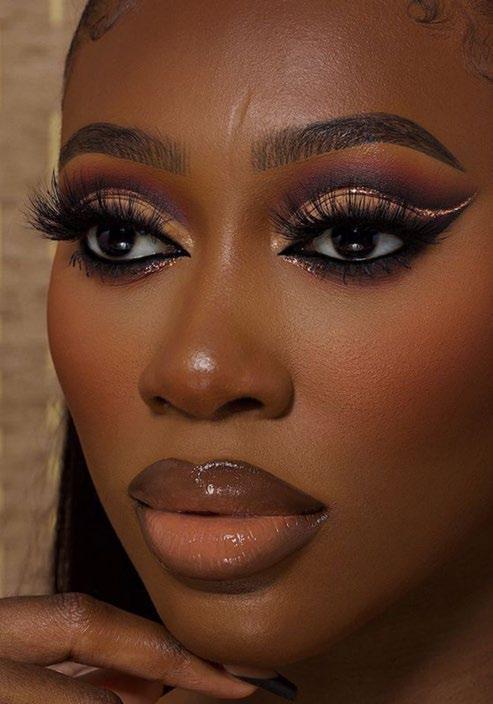
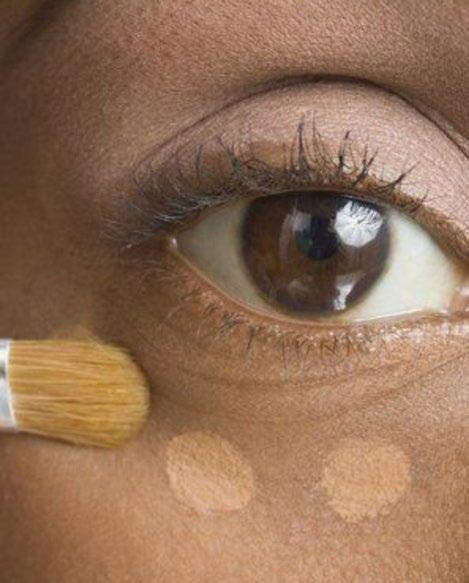
(5) WORK ON YOUR EYEBROWS
Your makeup will only be worthwhile if you can complete it with beautiful face-framing eyebrows. Whatever style you choose to do with your brows, avoid using an eyebrow pencil or powder that is too dark. It will make you look angry. You can use an eyebrow gel to help create fuller brows that stay in their place.
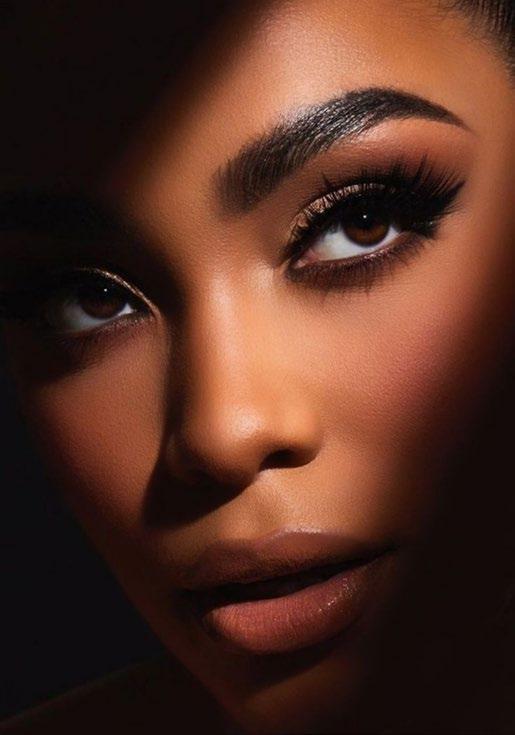
(4) ADD MORE GLITTER

When it comes to festive season looks, glitter is all the rage. Many people describe glitter makeup as a bit risque and even cheesy but do not let that deter you from having fun with your makeup this festive season. After all, it is the season of sparkles. If you will be wearing glitter on your eyes, choose neutral-coloured lipstick and skip the contouring. The whole focus needs to be on your glittery eyes to avoid any form of tackiness.
(7) PREP YOUR FACE
It's very important for you to make sure that your skin is in prime condition for the festive season. Exfoliate your face to prevent skin flakiness and breakouts.

(6) CARRY THE ESSENTIALS
During this festive season, you must carry some makeup essentials to whatever event you attend. These makeup essentials include blotting paper, pressed powder and lipstick. If you are not into taking makeup with you, use long-lasting makeup to save you from fixing any creasing, smudging or raccoon eyes at the party.

PAGE 13 CHRISTMAS EDITION 2022 THEWILL DOWNTOWN • www.thewilldowntown.com BEAUTY
FEATURE CHRISTMAS CLOTH, GOOD TIDINGS
 BY KEHINDÉ FAGBULE
BY KEHINDÉ FAGBULE

Throughout the calendar year, most people look forward to one season, Christmas. Growing up, not a lot of holidays trump this one. Before we could even tie our own shoelaces, we had our first encounter with Santa Claus, or a more culturally appropriate name, ‘Father Christmas.’ Now, this man in a red suit with a protruding belly—for some reason, he has a beer belly looking like he is in his second trimester—is one we don’t see very often. We only got to see him on Christmas when he came bearing gifts. As kids, this was one of the best feelings ever, and only one thing trumped it—dressing the part on the big day.
It doesn’t matter what background we come from; our parents work twice as hard to ensure that we are trapped in that Christmas fairytale for as long as our innocence remains through our childhood. And because the importance of looking prim and proper on the day is not lost on them, Christmas cloth became a silent obligation many of them take on to make us feel special. Whether you are going to a recreational park to sit on Father Christmas’s lap or on your way to church to hear a sermon about the reason for the season, Jesus Christ, Christmas cloth has always been a significant fixture in Nigerian festivities.
Remember how you used to feel. Alit by the smell of new fancy shoes, the readymade gown in a transparent synthetic bag hung up in the wardrobe, the new hairdo (for girls, parking gel was almost a nationally recommended hairstyle), the plastic sunglasses that completed whatever look we had imagined in our little minds. These distant relatives would come to visit and bless our promise cards afterwards, the living room decor that didn’t take a lot of effort to assemble, the Christmas light that is typically accompanied by a serenade of soothing Christmas song instrumentals, the usually dry but really relaxing almost-harmattan weather, and how can we even forget the chicken in the kitchen? The fowl we had slaughtered the night before, putting hands together in the kitchen to pluck out its feathers, strongly believing the superstition that the more you gossip while at it, the faster its feathers—a dead and almost skinned poultry—
keep growing back. Christmas was not just a day; it was a feeling, an experience that evokes good tidings, one that unites the family regardless of how dysfunctional it might have been for the past 11 months. I remember my mum constantly rebuking everyone who dares to rechristen the season’ X-mas,’ enunciating clearly that the reason for the season must never be replaced with an ‘X,’ basically an unknown. It wasn’t until I grew older I fully understood the significance of what she was trying to say, seeing how the capitalist western world has attempted to commercialise the holiday over the years, rebranding it to strip it of its essence.
Christmas has always been about family. And although more Nigerian families have witnessed systemic disenfranchisement thanks to the mass emigration that has seen loved ones grow apart, continents away from each other, we can at least acknowledge the primary purpose the season seeks to achieve: an understanding of the birth of Jesus in a manger, surrounded by family and loved ones—the three wise men who came bearing gifts—wrapped in the first ever Christmas cloth as He, a newborn, spreads good tidings all across the world.
CHRISTMAS EDITION 2022 PAGE 14 THEWILL DOWNTOWN • www.thewilldowntown.com
ALL THE FUN THAT HAPPENED AT THE 7TH EDITION OF THE








UNOFFICIAL CHRISTMAS PARTY
Nothing feels more exciting than rounding off the year in a grand, fun way. After much anticipation, the 7th edition of The Unofficial Christmas Party (The UX Party)—the biggest party of the year for corporate organizations, was finally held at the Balmoral Convention Center, Federal Palace Hotel, Victoria Island, Lagos.
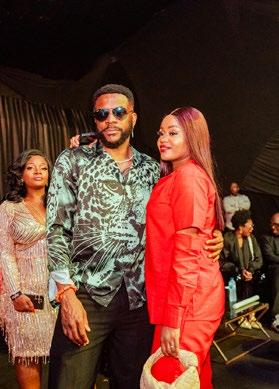
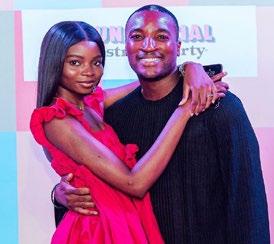
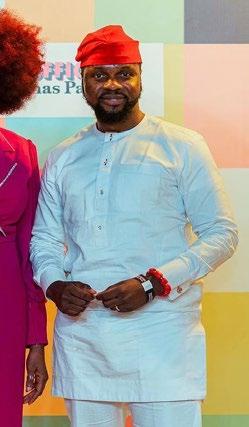
The UX Party was exciting and worth all the time as guests were treated to one of the best party experiences in Lagos. The venue was designed and lighted to create an unusual ambience of luxury, elegance, and excitement that resonated with such an event. The evening started with the arrival of guests at the venue with welcome drinks. Simultaneously, guests indulged in timeless pictures inside the photobooths while they waited to be ushered into the party hall.


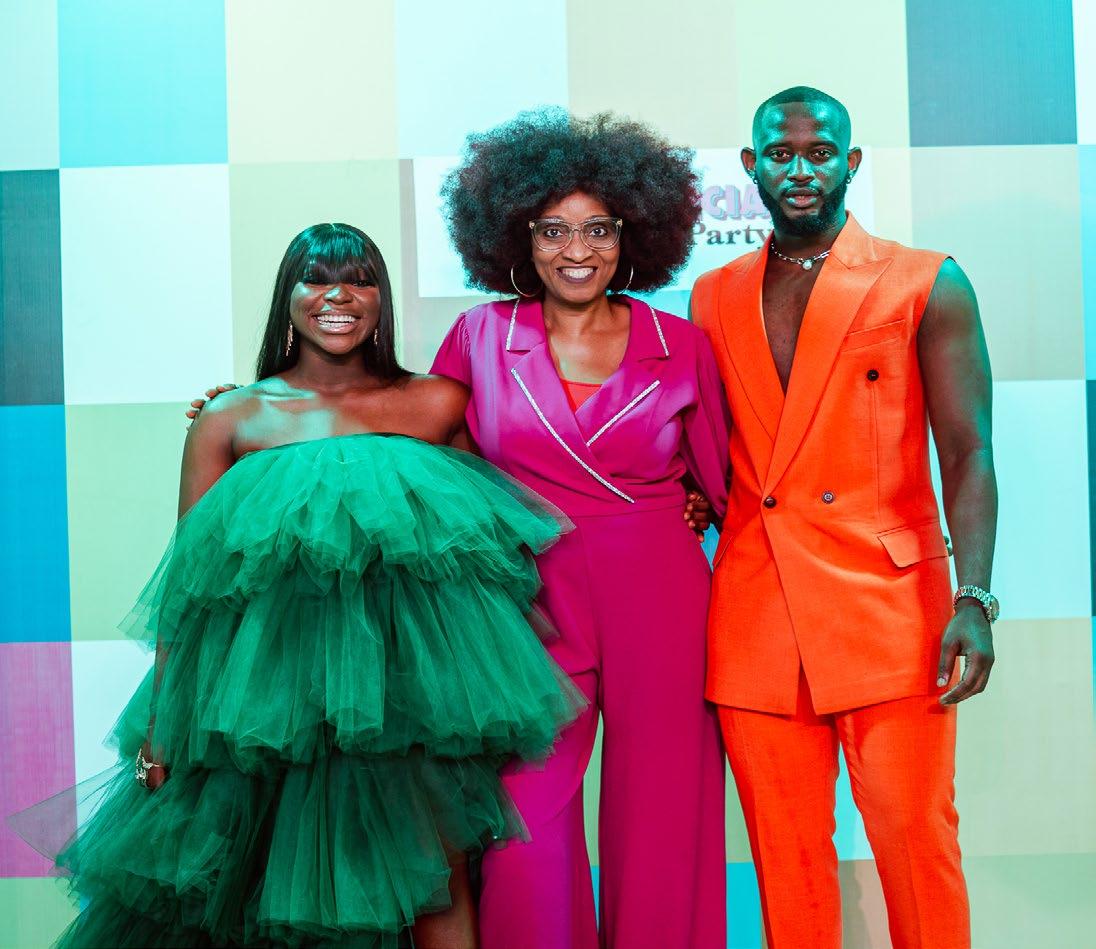
It was a fun night that the excited guests wouldn't forget in a hurry!
Safe to say, the 8th edition will be one for the books!
Feeling the music

PAGE 15 THEWILL DOWNTOWN • www.thewilldowntown.com CHRISTMAS EDITION 2022
THE SCENE DOWNTOWN
Adebola Williams
Teni Working up The Crowd
Mo'Cheddah
Samuel Abiola-Jacobs
Akah & Claire Nnani
L- Chinenye Laure Mgbemere R- Ebenge Eyibo
Bolanle Olukanni
Tomike Adeoye, Funmi Victor-Okigbo & Temisan
Adriana Hernandez
Chinwe Udo-Davis
Emmanuel & Laju
Chalya Shagaya
Ebuka & Cynthia Obi-Uchendu
Wuraola Kolawole
BY BOLUWATIFE ADESINA


MOVIE REVIEW:





Avatar: The Way of Water
Blumhouse—a production up terrible champion are just Nanny, Part ghost and visually. is Senegalese wellyoung York Monaghan) is Rose, while (Morgan Spector), Rose, feed has picked, sends her a ticket for America, to threaten straight-forward horror narrative with weaves a sense throughout her both powerful rich, but The story characters very least, paints a career woman and her gloriously. Diop. Her between brings
If they gave out Oscars for pure ambition alone, James Cameron’s rivals might not bother showing up. His original 2009 Avatar, a 3D action epic about 10-foot blueskinned aliens, remains by some measures the most successful movie ever made; 13 years on, the first of four planned sequels will need to perform comparably well just to break even.

But this seems entirely achievable since, like its predecessor, Avatar: The Way of Water packs in every kind of popular appeal it can. The Avatar Franchise, as we may now have to call it, is built on paradoxes all along the line, being family-friendly but violent, pacifist but gung-ho when needs be, a plea for the oppressed and a juggernaut designed to conquer the planet.
If Cameron truly believes in anything, it’s the power of bigscreen spectacle. And more than ever, he’s determined to give us the works: sublimely hazy fantasyart landscapes, battles on land, sea and air, huge monsters and cute critters, all realised with the kind of hallucinatory hyperrealism only possible for an obsessive on a budget north of 250 Million USD.
At the same time, Cameron is so steeped in the grammar of Hollywood storytelling there’s hardly a plot point in The Way Of Water that doesn’t feel familiar. Beneath its science fiction trappings, this is basically a romantic adventure story about a coloniser who “goes native”, a tradition that long predates the invention of cinema. Some have even called the franchise ‘Space Pocahontas’.
By the end of the first Avatar, the former Marine hero Jake Sully (Sam Worthington) had left his human body behind to begin life anew as a Na’vi – one of the aforesaid blue-skinned aliens living in harmony with nature on Pandora, an idyllic jungle moon a galaxy away from Earth.
A decade on, Jake leads a band of Na’vi insurgents holding out against the human invaders (or “sky people,” as they’re known to their foes). His onetime commanding officer Miles Quaritch (Stephen Lang), the first film’s villain, has meanwhile been reborn in his own Na’vi body – though his transformation, unlike Jake’s, is strictly an outward one.
After the skirmishes that occupy the film’s first act, Jake, his wife Neytiri (Zoe Saldana) and their children are forced to flee, taking refuge with a seadwelling clan known as the Metkayina (who resemble the Na’vi but are turquoise and more muscular). Quaritch sets out to hunt them down, but meanwhile, there’s time for them to adjust to their new life – and for Cameron to indulge his long-held love of the marine environment.

Once a familiar threat returns to finish what was previously started, Jake Sully must work with Neytiri and the army of the Na’vi race to protect their planet.
Like every other Cameron film, the screenplay lacks genuine depth while also delivering some all-time groaners of dialogue. The story’s main conflict is also mechanical, but the performances are all leagues above the first entry, with Worthington (whose human form isn’t glimpsed once this time) far sturdier in the protective-dad role than he was in white-saviour mode. The Na’vi kaids are all strong, too – good thing, as Cameron is stuck with them for the next four or five or six or however many films.





The film’s MVP, though, has to be Sigourney Weaver, who plays a teenage alien girl with such an effortless, natural mix of adolescent confidence and selfconsciousness that the whole thing feels supernatural. Even her character design balances something organic and artificial — it is just right and extremely unsettling and mightily impressive. I mean, yes, I guess this is exactly what I would imagine Sigourney Weaver might look like were she 13 years old, blue and seven feet tall. Good, weird, freaky, job, everyone.
As ever, there will be James Cameron skeptics. After all, despite the first Avatar being the highest-grossing film of all time, the conversation leading up to The Way of Water’s release has pivoted around the question of “Why???”. Certainly with its (3hr 15min) runtime, visual language and good vibes, the film has set up its own challenges for an easily exhausted and deeply cynical audience. But once you sink (I guess dive/swim/plunge/choose your own method of submersion) into Cameron’s world, you will be rewarded with the work of a master filmmaker trying to, and succeeding in, one-upping himself. It takes a heart of stone, and an eye of ice to enter Pandora and not be at least a little moved, inspired, and transported.
May James Cameron continue to think bigger of himself and his audience for decades to come.
Avatar: The Way of Water is in cinemas from December 15.
7.7/10
 Scan this with your camera to access the playlist (Apple Music)
Scan this with your camera to access the playlist (Spotify)
Scan this with your camera to access the playlist (Apple Music)
Scan this with your camera to access the playlist (Spotify)
CHRISTMAS EDITION 2022
Chet Baker Quartet_ Russ Freeman - Winter Wonderland
Frank Sinatra_ B. Swanson Quartet - Let It Snow! Let It Snow! Let It Snow! (with The B. Swanson Quartet)
André Persiany - Christmas Song
samara joy - warm in december
Nat King Cole - The Christmas Song (Merry Christmas To You)
Nat King Cole_ John Legend - The Christmas Song (Chestnuts Roasting On An Open Fire) (duet with John
Gloria Lynne - I Wish It Would Snow
Wham! - Last Christmas
Mariah Carey - All I Want for Christmas Is You
PAGE 16
Jimmy Smith_ Wes MontgomeryBaby, It's Cold Outside


















 BY DAVID NWACHUKWU
BY DAVID NWACHUKWU


































 BY KEHINDÉ FAGBULE
BY KEHINDÉ FAGBULE






























 Scan this with your camera to access the playlist (Apple Music)
Scan this with your camera to access the playlist (Spotify)
Scan this with your camera to access the playlist (Apple Music)
Scan this with your camera to access the playlist (Spotify)